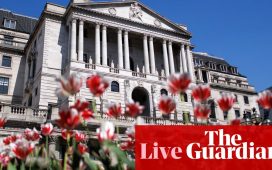This article is an on-site version of our Inside Politics newsletter. Sign up here to get the newsletter sent straight to your inbox every weekday
Good morning. Has Labour’s difficult week changed my perception of what the most likely outcome of the next election is, and its timing? That’s the question some of you are asking and I think it’s always healthy to set down intermittently what my sense of the overall direction of UK politics is, because that way I can’t wriggle out of it later when I’m catastrophically wrong.
I’m also planning one of my trips out to marginal seats to try to get a sense of the mood and I like to have some written record of my thoughts beforehand.
The short answer is “no” on the outcome but “yes” on the timing — the longer answer is below.
Inside Politics is edited by Georgina Quach. Follow Stephen on X @stephenkb and please send gossip, thoughts and feedback to insidepolitics@ft.com
What will happen at the next election?
Have Labour’s difficulties over the Israel-Hamas war changed my sense of what will happen at the next election? Not really. My feelings about the next election are shaped by the following things, in no particular order:
1) UK households are in a rough old state and they are going to get worse not better. For essentially everyone who will have to refinance their mortgages between now and the next election, the situation is better this year than it was last year. And they are better off than they would have been had Rishi Sunak not replaced Liz Truss. However, by the time these households refinance, they will find themselves worse off than they are now. They will continue to feel that way for a while, even if the overall economic picture improves. That, on top of everything else going on, is terrible for an incumbent government.
2) The Conservative party has been in power for 13 years. It is essentially on the hook for everything wrong in the UK, whether it be the result of its own decisions or simple bad luck.
3) Keir Starmer does not scare people.
4) There is clearly a huge appetite among voters for “anyone but the Conservatives” and this will continue not only in local elections and by-elections but at a general election.
Something could happen between now and the next election to change most of these things, but it is not particularly likely. It’s like saying “I could win the lottery between now and the next election” — sure, it’s true, there’s a chance that could happen. But it’s not a big chance. And as with my chances of winning the lottery, we have to ask questions like “Stephen, do you actually ever buy lottery tickets?” and “Stephen, do you know which shops either near your flat, near parliament or the FT offices sell lottery tickets?” and then I have to answer that, truthfully, I do not buy lottery tickets nor do I have a good idea of where I might do so.
In the Conservative-Labour case, we have to ask questions like “does the present incarnation of the Conservative party look like it has enough about it to proactively change any of those things?” (not from anything I’ve seen), and “does the Labour party look like it has the potential to make mistakes?” (yes, just look at this week).
So to beat the remaining life out of the lottery ticket metaphor, we’re really at the “there’s a possibility I might pick up a lottery ticket that dropped on the floor which turns out to be a winning ticket”. Which, as I say, is not zero but it’s not high. And “not zero but not high” is basically where I would put the chances of Labour being defeated at the next election.
When will it be?
One thing I struggle with when I think about the date of the next election, and when I talk to Conservative ministers, MPs and strategists, is that when I consider what I’ve heard and review the historical record, it all points towards the latest possible date (the end of a five-year term). In 1997 and 2010 — the last two times the UK has had a change of party in power — the ruling party held on until the last possible moment.
The same is also true of 1964. And it is only not true in 1979 because Jim Callaghan lost a confidence vote. The exceptions, 1970 and 1974, were both shock defeats for the incumbent parties. In 1951, the Labour government barely had a majority, most of the cabinet was essentially dying of old age and they had already held on until the last possible moment in 1950. So that points to the last possible date this time around, January 28 2025.
One of Rishi Sunak’s strengths as a politician is he is good at inspiring loyalty among his staff, so when I hear from his aides and close allies that he will “turn the polls by x date’” I don’t think that is because it is the line-to-take. I think they’re wildly optimistic. But I think they’re wildly optimistic because they’re devoted to their boss. As such that also points to the last possible date, because I don’t think Sunak’s inner circle are ever going to think that their position is irrecoverable. Which again gets you to January 28 2025.
I’ve said this a lot, but I have a nagging concern here, which is that holding an election in January is just really, really, really, really dumb. Politicians do dumb things all the time, but you know, we really are talking “so dense that light cannot escape you” levels of stupid here. And I just don’t think that the Sunak operation is dumb.
So although the form book points to January 28 2025, and although when I sit down and make the case for any date I end up with January, I think that can’t possibly be right. I note that Lucy Fisher made the astute observation that the video produced to mark Rishi Sunak’s first anniversary as prime minister included the following line:
“So what can a country achieve in 52 weeks? Watch this space.”
And I think “yeah, late October makes sense as the latest non-stupid date a government could pick for the next election”, avoiding as it does the worst of the winter weather, the NHS’s winter difficulties, and ruining Christmas for most voters. So: late October 2024. (Your thoughts welcomed in our poll below).
Now try this
As long-term readers will know, I write the first draft of this email in the small hours of the morning with a pot of tea (today it’s mint) while listening to the BBC’s excellent “Night Tracks” programme. Georgina wakes up horribly early, edits it, and then has the unlovely job of phoning me to say things like “Stephen, this sentence doesn’t make any sense” or “Boris Johnson has resigned so this whole email has to be rewritten”.
Recent highlights include “Lumen”, a really beautiful piece from last night, recent discoveries made as a result of it include Atmospheriques, a wonderful record by the Iceland Symphony Orchestra, both of which I’ve added to the Inside Politics Playlist.
I’m very excited to be seeing a live version of the programme at Kings Place this weekend and I’m very grateful to the many FT readers who brought my attention to it (given how few tickets there were when I got to it, it really was a very, very well-timed set of messages).
However you spend it, have a lovely weekend!
Top stories today
When do you think the next election will take place? Vote by clicking here.












